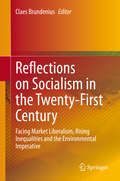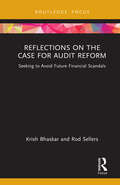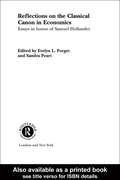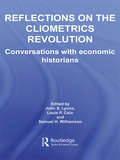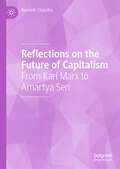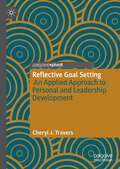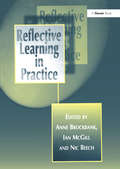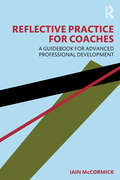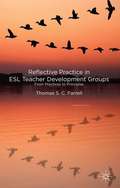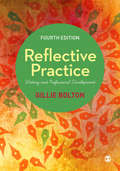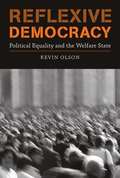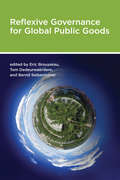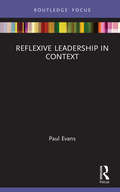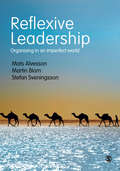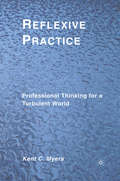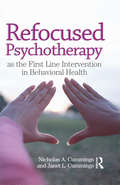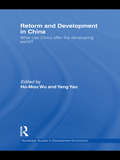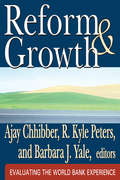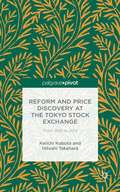- Table View
- List View
Reflections on Socialism in the Twenty-First Century: Facing Market Liberalism, Rising Inequalities and the Environmental Imperative
by Claes BrundeniusIn this volume, the authors reflect on the question “what is socialism” as it pertains to today’s economy. There is particular emphasis on democratic socialism models as a potential alternative to classic authoritarian socialism. A number of topical questions are addressed such as: What is democratic socialism and is it feasible, or even viable? What can be learnt from existing democratic socialist experiences? What would an ideal democratic socialist society look like today? Under what circumstances, and where, could such a model emerge today? In exploring these questions, several themes arise within these chapters such as the role of socialist values and inspirations in capitalist societies; and how capitalism and socialism relate to the knowledge economy. The contemporary world is showing many contradictions with uncertain future scenarios that preoccupy mankind. The global capitalist system as we know it is in deep crisis—and some even predict its slow death, because of its inability to handle the environmental imperative. At the same time, classic socialism as experienced in the Soviet Union and its proxies is a stone dead alternative to capitalism today. So what options remain? The book considers this question as it examines a range of countries where socialism (in one form or another) has arisen, or where democratic socialism could be possible, including Brazil, Chile, Cuba, Sweden and the United States.
Reflections on the Case for Audit Reform: Seeking to Avoid Future Financial Scandals (Disruptions in Financial Reporting and Auditing)
by Krish Bhaskar Rod SellersThis is the final volume in a four-book miniseries dealing with disruption in audit and financial reporting, this last book focusing on the importance of developing the purpose and concept of auditing in a holistic rather than piecemeal way, whilst reflecting on the case for audit reform.It looks beyond current events and explores possible new entrants to the market, the role of regulation versus professionalism, developing a more prominent and reinvigorated auditing profession and how to meet wider stakeholder needs. The authors’ key proposal for discussion is for the traditional passive audit to be replaced with a proactive style of audit, where granular opinions, forward looking analysis and sensitivity reviews can aid the reader of accounts to come to their own conclusions.This book should act as a catalyst for radical thinking professionals, students, academics and company directors to influence future government reforms to meet societal needs in the twenty-first century.
Reflections on the Classical Canon in Economics: Essays in Honour of Samuel Hollander (Routledge Studies In The History Of Economics Ser. #Vol. 41)
by Evelyn L. Forget Sandra PeartIn this discipline-defining volume, some of the leading international scholars in the history of economic thought re-examine the concepts of 'classical economics' and the 'canon', illuminating the roots and evolution of the contemporary discipline.
Reflections on the Cliometrics Revolution: Conversations with Economic Historians (Routledge Explorations In Economic History Ser. #38)
by John Lyons Louis Cain Samuel WilliamsonThis volume marks fifty years of an innovative approach to writing economic history often called "The Cliometrics Revolution." The book presents memoirs of personal development, intellectual lives and influences, new lines of historical research, long-standing debates, a growing international scholarly community, and the contingencies that guide an
Reflections on the Future of Capitalism: From Karl Marx to Amartya Sen
by Ramesh ChandraThis book explores the ideas of nine renowned economists to present the evolution of economic thought on the development and trajectory of capitalism as a system. The author shows how this diverse group of thinkers are linked by their thinking on the future role of capitalism in society and fleshes out the influences informing each economist’s work. With chapters dedicated to Karl Marx, Joseph Schumpeter, Thorstein Veblen, Henry George, Gunnar Myrdal, Alfred Marshall, Allyn Young, J. M. Keynes and Amartya Sen, the book aims to analyse contrasting views on the future of capitalism in historical perspective and make a critical assessment of their insights in contemporary contexts. While considering the views of some thinkers such as Marx, Schumpeter, and Veblen who critiqued capitalism, the book does not view capitalism beyond redemption, nor is meant to be a critique of capitalism in its conclusions. Rather, it argues that thinkers like Marshall, Myrdal, Young and Keynes were more right in their optimism about the future prospects of capitalism than many others. It argues that capitalism can be reformed through the democratic process in a more humane direction. This can happen if democracy works for all, and if discriminating privileges and crony capitalism are eschewed. This book is valuable reading for scholars and students of economic history and the history of economic thought.
Reflective Goal Setting: An Applied Approach to Personal and Leadership Development
by Cheryl J. TraversThis book presents, for the first time, a comprehensive overview of the Reflective Goal Setting model, its theoretical framework and origins, and its practical applications for personal development, improved coping and reduced stress, academic growth and performance and leadership.Divided into three parts, the author begins by examining the particular importance of personal development, and in particular soft and interpersonal skills development. It addresses the limitations of current personal development and leadership education and training for the transfer of learning, before outlining how Reflective Goal Setting fulfils this need. It presents a critical review of Goal Setting Theory and approaches to reflective practice that demonstrates how the Reflective Goal Setting model was developed from, and builds upon, these earlier approaches. Drawing on original research and illustrative case studies, the author details the cyclical five step process of the Reflective Goal Setting model across 5 chapters - forming Part 2 of the book. Part 3 examines the practical applications and impact of using Reflective Goal Setting, employing illustrative case studies from a variety of settings including higher education, professional development and executive education.This innovative work will provide a valuable resource for researchers and practitioners in Organisational and Industrial Psychology, Education, and Business and Management and indeed anyone who wants to work on their own personal development.
Reflective Learning in Practice
by Anne Brockbank Ian McGillThis book gathers together details of seventeen case studies of learning in practice, after having set the issue of reflective learning in a theoretical context. The cases are drawn from a wide range of situations and discuss both apparent successes and failures. The cases are used as a basis to develop general findings. These general findings are expressed as themes and questions so that, as readers come across new circumstances, they are not limited by prescriptive recipes. Instead they are empowered by having both an open and focused approach: open because the starting point is questions rather than answers, and focused because the questions direct attention to factors that have been found to be influential for effective, reflective learning. The crucial factor is the ability of managers and others to extract quality learning from experience. Reflective Learning in Practice develops an approach that will help this to happen.
Reflective Practice for Coaches: A Guidebook for Advanced Professional Development
by Iain McCormickThis practical evidence-based guide to running Reflective Practice professional development programmes provides a dynamic and engaging resource for a wide range of coaches. Reflective Practice is a proven learning and development approach that involves consciously and deliberately thinking about experiences to develop insights and apply these within coaching practice. McCormick argues that it is vital that coaches regularly reflect on their work to develop and grow professionally, and this book provides a definitive and rich source of material on how and what to reflect on. Topics include how to reflect as an individual coach; working in pairs and small groups; applying reflective practice in a training context; and how to run advanced group sessions for coaches. The book features a wide range of practical workbook exercises to challenge the reader’s current practice and extend their capability, as well as an evidence-based guide to enhancing skills in recently developed areas such as Unified Protocol Cognitive Behavioural Therapy, Internet Supplemented Acceptance and Commitment Therapy, and Using Schema Therapy with Mindfulness Techniques. Written by a highly experienced executive coach, this book is full of practical and effective ways to become more capable and proficient. It is essential reading for any career, life or executive coach who wishes to enhance their coaching capability through reflective practice, as well as for coaching training organisations, senior executive coaches offering sessions for other coaches, and academic institutions offering coaching qualifications.
Reflective Practice in ESL Teacher Development Groups
by Thomas S.C. FarrellReflective Practise in ESL Teacher Development Groupsdiscusses the concept of reflective practice in ESL teachers using data from a 3-year collaborative partnership in which three ESL teachers in Canada explored their professional development through reflective practice. "
Reflective Practice: Writing and Professional Development
by Gillie BoltonReflection and reflexivity invite critical, sensitive examination of practice, exploration of principles, concepts and ideas, and development of thoughtful self-awareness. <P><P> The Fourth Edition of this bestselling book explains how expressive and explorative writing, combined with in-depth group work or mentoring, can widen perspectives and give clarity of values, roles, and responsibilities. Step-by-step methods are grounded in carefully explained theories and values, and key terms such as reflection, reflexivity, critical, narrative, metaphor, mindfulness and complexity are clarified.<P> New to this edition:<P> * a clear route through the essentials of reflective practice<P> * greater clarity and representation of theoretical models<P> * a strong focus on ethical values<P> * in-depth examples and case studies from a range of courses<P> * clear summarization of each chapter’s key contents<P> * updated ‘Read to Learn’ sections and extended glossary<P> * discussion of writing in different cultures<P> * new online content including videos.
Reflektierte Zielsetzung: Ein Ansatz zur Persönlichkeits- und Führungskräfteentwicklung
by Cheryl J. TraversDieses Buch präsentiert erstmals einen umfassenden Überblick über das Modell des "Reflective Goal Setting", seinen theoretischen Rahmen und Ursprung sowie seine praktischen Anwendungen für die persönliche Entwicklung, verbesserte Bewältigung und Stressreduktion, akademisches Wachstum und Leistungsfähigkeit sowie Führung. In drei Teile gegliedert, untersucht die Autorin zunächst die besondere Bedeutung der persönlichen Entwicklung, insbesondere der Entwicklung von Soft Skills und zwischenmenschlichen Fähigkeiten. Unter Verwendung von Originalforschung und anschaulichen Fallstudien beschreibt die Autorin den zyklischen Fünf-Schritte-Prozess des "Reflective Goal Setting" in fünf Kapiteln, die Teil 2 des Buches bilden. Teil 3 untersucht die praktischen Anwendungen und Auswirkungen der Verwendung von "Reflective Goal Setting" anhand anschaulicher Fallstudien aus verschiedenen Bereichen, einschließlich Hochschulbildung, beruflicher Entwicklung und Führungskräfteentwicklung. Dieses Werk ist eine wertvolle Ressource für Forscher:innen und Praktiker:innen in den Bereichen Organisations- und Industriepsychologie, Bildung sowie Wirtschaft und Management sein - und für jede/n, der/die an der persönlichen Entwicklung arbeiten möchte.Die Übersetzung wurde mit Hilfe von künstlicher Intelligenz durchgeführt. Eine anschließende menschliche Überarbeitung erfolgte vor allem in Bezug auf den Inhalt.
Reflexive Democracy: Political Equality and the Welfare State
by Kevin OlsonSince the Reagan and Thatcher revolutions of the 1980s, there has been little consensus on what welfare ought to do or how it ought to function. At the same time, post-Wall continental Europe searches for a "third way" between state-planned socialism and laissez-faire capitalism. In Reflexive Democracy, Kevin Olson takes on this contemporary conceptual crisis. He calls for a "political turn" in considerations of the welfare state, arguing that it should no longer be understood in primarily economic terms--as a redistributive and regulatory mechanism--but in political terms, as a means of living up to deep-seated values of political equality. Drawing on arguments by T. H. Marshall and Jurgen Habermas, Olson proposes a conception of political equality as the normative basis of the welfare state. He argues that there are inextricable connections between democracy and welfare: the welfare state both promotes political equality and depends on it for its own political legitimacy. The paradox of political equality as a precondition for political equality is best solved, Olson argues, by guaranteeing citizens the means for equal participation. This is a reflexive conception of democracy, in which democratic politics circles back to sustain the conditions of equality that make it possible. This view, Olson writes, is meant not to replace traditional economic concerns but to reveal deep interconnections between democratic equality and economic justice. It counters paternalistic ideas of welfare reform by focusing on citizen participation. This conception moves beyond simple equality in the possession of goods and resources to propose a rich, materially grounded conception of democratic equality.
Reflexive Governance for Global Public Goods
by Eric Brousseau Tom Dedeurwaerdere Bernd SiebenhünerGlobal public goods (GPGs)--the economic term for a broad range of goods and services that benefit everyone, including stable climate, public health, and economic security--pose notable governance challenges. At the national level, public goods are often provided by government, but at the global level there is no established state-like entity to take charge of their provision. The complex nature of many GPGs poses additional problems of coordination, knowledge generation and the formation of citizen preferences. This book considers traditional public economy theory of public goods provision as oversimplified, because it is state centered and fiscally focused. It develops a multidisciplinary look at the challenges of understanding and designing appropriate governance regimes for different types of goods in such areas as the environment, food security, and development assistance. The chapter authors, all leading scholars in the field, explore the misalignment between existing GPG policies and actors' incentives and understandings. They analyze the complex impact of incentives, the involvement of stakeholders in collective decision making, and the specific coordination needed for the generation of knowledge. The book shows that governance of GPGs must be democratic, reflexive--emphasizing collective learning processes--and knowledge based in order to be effective.
Reflexive Governance for Global Public Goods (Politics, Science, and the Environment)
by Eric Brousseau Tom Dedeurwaerdere Bernd SiebenhünerGovernance challenges and solutions for the provision of global public goods in such areas as the environment, food security, and development.Global public goods (GPGs)—the economic term for a broad range of goods and services that benefit everyone, including stable climate, public health, and economic security—pose notable governance challenges. At the national level, public goods are often provided by government, but at the global level there is no established state-like entity to take charge of their provision. The complex nature of many GPGs poses additional problems of coordination, knowledge generation and the formation of citizen preferences. This book considers traditional public economy theory of public goods provision as oversimplified, because it is state centered and fiscally focused. It develops a multidisciplinary look at the challenges of understanding and designing appropriate governance regimes for different types of goods in such areas as the environment, food security, and development assistance.The chapter authors, all leading scholars in the field, explore the misalignment between existing GPG policies and actors' incentives and understandings. They analyze the complex impact of incentives, the involvement of stakeholders in collective decision making, and the specific coordination needed for the generation of knowledge. The book shows that governance of GPGs must be democratic, reflexive—emphasizing collective learning processes—and knowledge based in order to be effective.
Reflexive Kompetenzentwicklung in der Lehrer*innenbildung: Mit Podcasts im ePortfolio auf dem Weg zur Professionalität
by Annette BusseReflexion gilt als Kernkompetenz pädagogischen Handelns im Lehrer*innenberuf, dennoch ist sie hinsichtlich ihrer Didaktisierung und Förderung umstritten. Die Studie konzeptualisiert das Modell der reflexiven Kompetenzentwicklung auf Grundlage von Elementen professioneller Kompetenz, wobei Reflexion als Basiskonstante im Professionalisierungsprozess angehender Lehrer*innen zugrunde gelegt wird. Es wird aufgezeigt, dass durch Podcasts, die von Studierenden selbst erstellt werden, das didaktische Potential von ePortfolioarbeit lernwirksam nutzbar und eine reflexive Kompetenzentwicklung ermöglicht wird.
Reflexive Leadership in Context (Management Practice Essentials)
by Paul EvansThis concise textbook seeks to unpack the real-life complexities of leadership by examining the theories and models surrounding it and encouraging self-analysis in the individual’s own contexts. The book: Provides an outline of the various perspectives of leadership theory; Develops a critical and robust framework for considering existing leadership theory and consequently applying leadership practice across the organization; Identifies important individual characteristics likely to enhance leadership practice in the workplace; Considers a framework for analyzing leadership performance and methods and practicalities for application. Reflexive Leadership in Context provides a practical and concise introduction for executive education students currently studying for MSc/MBA apprenticeship programs, as well as supplementary reading for postgraduate students studying modules within leadership and management.
Reflexive Leadership: Organising in an imperfect world
by Mats Alvesson Dr Martin Blom Dr Stefan SveningssonLecturers/Instructors - Request a free digital inspection copy here Making a case for a reflexive approach to leadership, the authors draw upon decades of carrying out in-depth studies of professionals trying to “do” leadership. Through interviews with managers and their subordinates, getting a good understanding of organizational context, and critically interpreting their observations considering both leadership theories and a wealth of other perspectives, their celebration of reflexivity is used to question dominant leadership thinking. Considering and challenging various departures from lines of reasoning results in a book that draws upon rich empirical material and which has a number of new, provocative, critical and constructive ideas that help to develop sharper and more thoughtful thinking and practice - both in academic and practical contexts. Suitable for leadership and organisation courses at upper-level undergraduate and upwards (including MBA-classes and Executive Education) and a thought provoking read for practitioners and management development professionals interested in leadership thought.
Reflexive Leadership: Organising in an imperfect world
by Mats Alvesson Dr Martin Blom Dr Stefan SveningssonLecturers/Instructors - Request a free digital inspection copy here Making a case for a reflexive approach to leadership, the authors draw upon decades of carrying out in-depth studies of professionals trying to “do” leadership. Through interviews with managers and their subordinates, getting a good understanding of organizational context, and critically interpreting their observations considering both leadership theories and a wealth of other perspectives, their celebration of reflexivity is used to question dominant leadership thinking. Considering and challenging various departures from lines of reasoning results in a book that draws upon rich empirical material and which has a number of new, provocative, critical and constructive ideas that help to develop sharper and more thoughtful thinking and practice - both in academic and practical contexts. Suitable for leadership and organisation courses at upper-level undergraduate and upwards (including MBA-classes and Executive Education) and a thought provoking read for practitioners and management development professionals interested in leadership thought.
Reflexive Methodology: New Vistas for Qualitative Research
by Mats Alvesson Kaj SkoldbergPraise for the Second Edition: "In opposition to most literature on how to conduct good social science research which is either empirically oriented or gives priority to theoretical and philosophical considerations, which tends to make empirical research look odd or irrelevant, this volume on ′Reflexive Methodology′ explicitly turns towards a consideration of the perceptual, cognitive, theoretical, linguistic, political and cultural circumstances as backdrop of data interpretation and research design. It showed up to be the most important and informative resource and a source of enlightenment to my lecture on methodology at our institute. I can highly recommend the volume to lecturers and students alike." Professor Sabine Troeger, Geography Institute - Library, University of Bonn Reflexivity is an essential part of the research process. Mats Alvesson and Kaj Sköldberg make explicit the links between techniques used in empirical research and different research traditions, giving a theoretically informed approach to qualitative research. The authors provide balanced reviews and critiques of the major schools of grounded theory, ethnography, hermeneutics, critical theory, postmodernism and poststructuralism, discourse analysis, genealogy and feminism. Useful reading for students and researchers across the social sciences. The first edition established itself as a ground-breaking success, providing researchers with an invaluable guide to a central problem in research methodology - namely, how to put field research and interpretations in perspective, paying attention to the interpretive, political and rhetorical nature of empirical research. The second edition introduced a new chapter on positivism, social constructionism and critical realism, and offered new conclusions on the applications of methodology. This third edition of Reflexive Methodology provides further updates on new research, including neorealism, and illustrations and applications of reflexive methodology in formulating research strategies, that build on the acclaimed and successful previous editions
Reflexive Practice
by Kent C. MyersBuilding upon the work of Donald Schon, this edited collection expands the research into the idea of the reflexive practice - understanding how to create better solution-oriented practices for business during turbulent and chaotic situations.
Refocused Psychotherapy as the First Line Intervention in Behavioral Health: As The First Line Intervention In Behavioral Health
by Nicholas A Cummings Janet L CummingsWritten by father-daughter psychologists Nick and Janet Cummings, this text provides proven patient-responsive interventions by practitioners who together have nearly a century of hands-on practice and innovation between them. Refocused Psychotherapy responds directly to the recent decline of psychosocial services and helps to put psychotherapy back as the first line intervention in mental health. The authors teach psychotherapists how to work side by side with primary care physicians to provide efficacy, effectiveness, and efficiency—the standards psychotherapeutic intervention is held up to. Detailed case studies are followed up by discussions of diagnosis, personality type, homework, and therapeutic techniques that show readers how to form their own case conceptualizations. The authors also teach readers how to treat their patients individually and to diagnose effectively through their onion/garlic conceptualization. Finally, they provide lists of common abbreviations that are helpful to know when reading prescriptions, and lists of drugs, drug interactions, dosage, and side effects that expand readers’ vocabulary and allow them to be more knowledgeable as they work with primary care physicians. These innovative and revealing techniques will help readers develop the skills necessary for cost-effective therapeutic results.
Reform and Development in China: What Can China Offer the Developing World (Routledge Studies In Development Economics Ser. #82)
by Ho-Mou WuBetween 1978 and 2006, GDP growth in China maintained an annual average rate of 9.7%, meaning the Chinese economy increased by more than twelve times. This was achieved with quite unorthodox approaches to reform and development as China has adopted a gradualist approach to adopting key institutions, as well as modifying and experimenting with traditional recipes for economic growth. This collection brings together key researchers in the field from Asia, US, Europe and Australia to discuss how China has managed to push forward reforms in the face of political resistance, how the Chinese economy has maintained growth within an imperfect institutionalist environment and how the Chinese government remains effective when it relinquishes its power to the market. Specific emphasis is paid to the relevance of China’s experiences to other developing countries. This valuable contribution to the study of China’s economy covers a wide range of topics, including the historical foundations of the 30 years of reform, law and development in China, foreign direct investment, poverty reduction, market integration, income distribution, social protection, as well as demographics and population. Reform and Development in China finds both unique elements to the Chinese experience and elements which can be applied to other developing countries. In particular, China’s gradualism in economic reform, strong leadership, and emphasis on inclusive development are singled out to be potentially transferable to other developing countries. This collection will be of interest to postgraduate students and researchers as well as practitioners in development economics.
Reform and Development of Agriculture in China
by Zhou LiThis book provides a detailed review of the accumulated experience and lessons from China’s agricultural reform and opening-up since the late 1970s, examining various aspects of this transition and providing a new perspective that can contribute to developing economic theories. The success of China’s reform and opening up creates benefits for farmers, and is driven by farmers. The past experience, problems revealed and lessons learned from failures of market-orientated and progressive reform can provide valuable guidance for those developing countries still lagging behind China.
Reform and Growth: Evaluating the World Bank Experience
by Ajay Chhibber R. Kyle Peters Barabara J. YaleAlthough the quest for growth remains as elusive as it was more than a decade ago, there is now much greater consensus on the policies and institutional changes that are needed to foster growth and economic development. But debate continues on the timing, sequencing, and local adaptation of these reforms. Furthermore, although the benefits of reform are well documented--the reasons as to why and when reforms occur still remain somewhat unclear. Many countries go through long periods of stagnation or even decline, without being able to create an environment for change, while others seem able to break the hold of vested interests and start following paths of reform.In October 2004, the Operations Evaluation Department (OED) of the World Bank held a conference on the Effectiveness of Policies and Reform. This event provided a forum at which participants--over 500 government officials, civil society representatives, and World Bank staff--could discuss how to improve the effectiveness of World Bank support for development policies and reform programs.Included in this volume are the contributions of distinguished development practitioners on issues such as: the links between good performance and policy change; how windows of opportunity can best be used to promote reform; how ownership of policies and reform programs can be encouraged; and how developed country policies can be improved to create a better global environment for development.
Reform and Price Discovery at the Tokyo Stock Exchange: From 1990 to 2012
by Keiichi Kubota Hitoshi TakeharaIn this book we analyze the impact of the evolution of the Tokyo Stock Exchange (TSE), at the same time discussing reforms in stock trading by related accounting standards and legal regulations.
